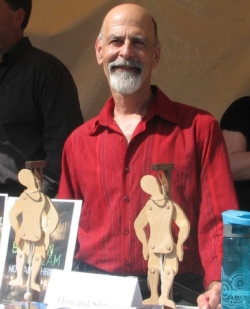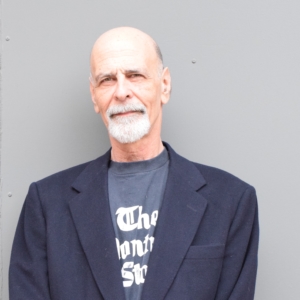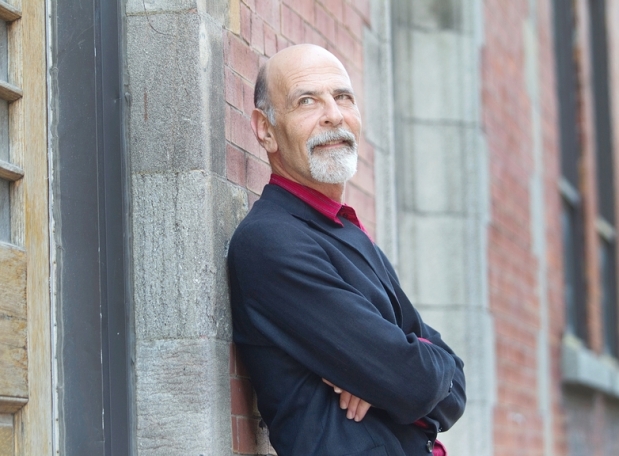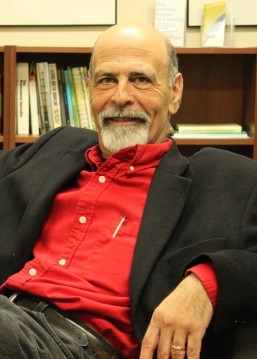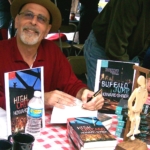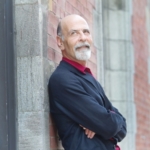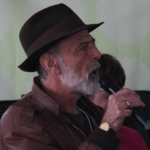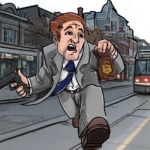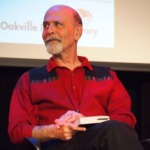By Jim Napier, The Sherbrooke Record, Friday, October 30, 2009
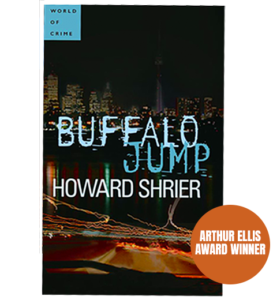
Crime books reviewer Jim Napier gave rave reviews to all four Geller novels. He interviewed me after Buffalo Jump won the Arthur Ellis Award for Best First Novel.
Time flies. Almost 18 months have passed since I first reviewed Canadian crime writer Howard Shrier. His debut novel, Buffalo Jump, was a strong beginning for the Toronto writer, and I suggested at the time that readers would want to keep an eye out for its sequel. Turned out, that was an understatement. Last June Shrier went to Ottawa to attend the Arthur Ellis Awards; he was there to collect the prize for Best First Novel of 2009. We touched base again recently, and had a chance to discuss his success and his plans.
Your debut novel, Buffalo Jump, was published to great acclaim in 2008. What’s happened to you (and it) since then?
It’s been an amazing time! After winning the Arthur Ellis Award for Best First Novel, Buffalo Jump sold out its first printing, and a production company acquired the film rights. That gave me more confidence as I was finishing the second book and certainly raised my profile within the crime writing community.
After taking four years to complete your first novel, I understand you promised your publisher the next one in twelve months. Whatever possessed you to commit to that sort of schedule?
My agent and I met with my prospective publishers while they were still considering whether to acquire the first book. They asked if I could keep up the pace of a book a year and, in a classic case of the mouth working faster than the brain, I said yes. The truth is, I did feel up to it. I knew the characters much better by then, and felt I’d honed my craft over four years of writing and revising Buffalo Jump.
Once you got going, your sequel, High Chicago, took just five months to complete. Would you do it the same way again, or are you planning to take a bit more time with subsequent novels?
My third book required a great deal more research and planning than the others and is taking a bit longer. I’m very close to finishing the first draft, but it won’t be ready in time for the summer of 2010.
“I need a lot of time at the beginning for ideas
to gestate and grow organically. To incubate, if you will.”
So you’ve settled into a pattern of writing now. How do you work? Do you outline or make extensive notes, or just “go with the flow?”
I’ve found that I need a lot of time at the beginning for ideas to gestate and grow organically. To incubate, if you will. So I research, make notes and slowly build an outline before I start writing the text. I don’t outline everything: just enough to know where I’m heading when I set out on the journey. As for my daily routine, I rent a little office in Toronto’s Annex neighbourhood. Surrounded by my books, both fiction and reference, I try to write at least 1,000 words every day. Most days I exceed it, sometimes by a little, sometimes by a lot.
Your series features a Toronto-based PI named Jonah Geller. What is his backstory, or personal history?
Jonah is a former soldier, and a martial artist. He was something of a lost soul in his teens and early twenties. His older brother Daniel is everything a Jewish mother wants—a successful lawyer, married with children, a pillar of the Jewish community—whereas Jonah is single and still struggling to establish himself. Jonah was smart but didn’t do well at school. He drifted around a bit and, for all the wrong reasons, ended up enlisting in the Israeli army, where his experiences affected him deeply and left him wanting to do some good in the world.
Geller has a female partner, Jenn Raudsepp, but they have a somewhat distant relationship. Will she play a more central role in your stories, or in Geller’s life, in the future? And what about Toronto detective Katherine Hollinger? There seem to be some sparks there.
Jenn is Jonah’s best friend and business partner, but she’s gay, so there is no possibility of romance there. This was a decision I made early on: I didn’t want the series to turn into Moonlighting or Cheers—will they or won’t they fall into bed one day? I wanted Jonah to be free to fall for other women. He definitely likes Homicide Sergeant Katherine Hollinger, but it’s a slow courtship. They were originally going to wind up in bed in book two, but events came up that prevented it from happening. That’s how it is sometimes with fiction: your characters or unplanned events spring up and surprise you.
So Geller heads off to The Windy City for his second adventure. But he doesn’t sever his ties with Toronto, and in fact calls on a former client to help him out of a jam.
Jonah finds himself overmatched in Chicago, up against a wealthy villain who has seemingly endless resources when it comes to rebuffing Jonah’s investigation or making attempts on his life. In Buffalo Jump he makes an unlikely friend in hit man Dante Ryan, and when he realizes how far he’s in over his head in Chicago, he knows Ryan’s unique skills are exactly what he needs to survive.
So where do you go from here? Tell us a bit about your next novel, which I understand is well underway.
Actually, the third book is a stand-alone thriller, set near Buffalo and told from multiple points of view, about a man who goes into the federal witness protection program to get away from a life of crime and violence, only to find that a corrupt sheriff has other plans for him. Because of the setting and the complexity of the story, and the challenge of writing in a different voice, it has taken longer than High Chicago, but I’m aiming to finish the draft by the end of November.
Combining fast-paced action with well-structured plots, and featuring a complex but likeable protagonist, Shrier’s novels are fast winning him legions of loyal fans. If you enjoy contemporary hard-boiled tales with nuanced characters, check out High Chicago; you won’t be disappointed.


